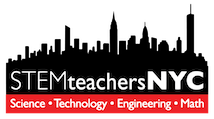Our mission is to cultivate excellence in STEM teaching and to promote deep understanding and success for students through innovative, teacher-led professional development.
How do you recognize excellence?
What do you mean by “innovative, teacher-led professional development.”
From the beginning, we drew upon the wisdom of two individuals: First Heraclitus, the Greek Philosopher, who said that you cannot step into the same river twice. – We take this to mean that change is always upon us; the river is constantly changing, just like the STEM classroom.
This means we must be humble in developing our workshops: teachers cannot simply transfer to their classroom the lessons and approaches demonstrated by a master teacher/workshop leader. Teachers must dynamically adapt whatever they learn in our workshops, so that it will work in their classroom with their kids.
Our workshop leaders do their best to help teachers develop their own repertoire and to explore in some depth the variety of responses kids may exhibit to whatever specific teaching ideas the workshop concerns. Beyond this, we try hard to connect teachers with a community of other teachers who can provide suggestions and feedback to help deal with the constantly changing classroom situation.
The second person is Bob Karplus: He had an outstanding career as a quantum field theorist before undertaking a new, equally, if not more, successful career in science education.
First, he had invented the concept of the “learning cycle” back in the fifties, when he first started thinking about science education. This was a dramatically new idea at the time, and Bob encountered substantial resistance from traditional educators; but the learning cycle has now become ubiquitous, and you can find it in some form in all modern curricula.

Our Future
In collaboration with Executive Director Yadana Desmond and many others, we have made real progress in the last two years. When confronted with the pandemic, we initiated an annual series of “Leader Huddles,” which generated a powerful set of conversations among leaders about how to preserve our signature qualities of personalization and interaction in our face-to-face workshops in the new format of online workshops.
We have institutionalized the huddles, and we now have a leader pathway for experienced leaders and a second brand-new pathway for new leaders. We’re investing big time in the quality and quantity of what I have always said is the primary engine of our success: the commitment and expertise of our leaders.
Evolution and Growth in the Impact of our Workshops
So, what do our workshops look like? What makes them special?

There’s the learning cycle, with students and teachers getting stronger gradually through an organic process of growth. Karplus’ concrete examples help us to uncover and explain the key models behind the phenomena. Teachers gain appreciation for students’ struggles and ways of thinking first by taking on a student’s role and then gain perspective by analyzing what happened in collaboration with colleagues.
We explore key content and pedagogy, and especially the common naïve conceptions many students (and also some teachers) have.
Most important there’s an experienced teacher or teachers leading the workshop, with real classroom experience with real kids always on tap, plus a supportive community of teachers, cooking up innovative ideas and approaches and testing/debugging them in the tradition of Bob Karplus.

